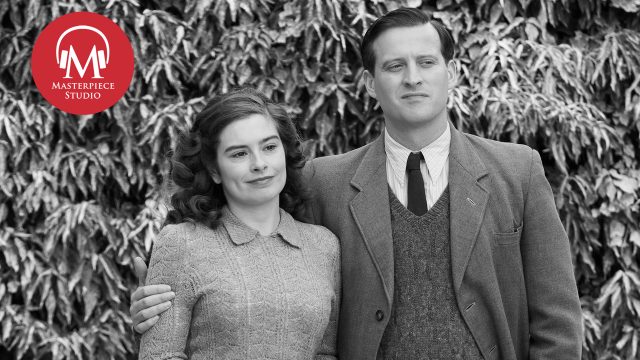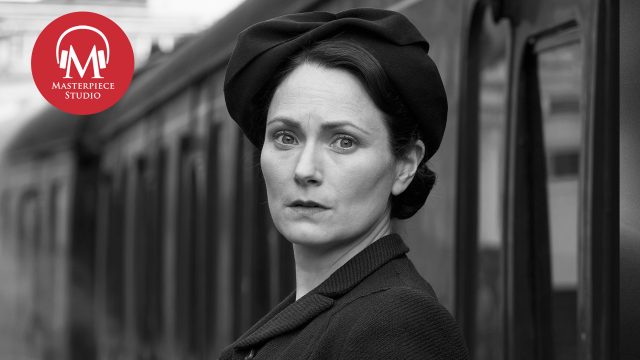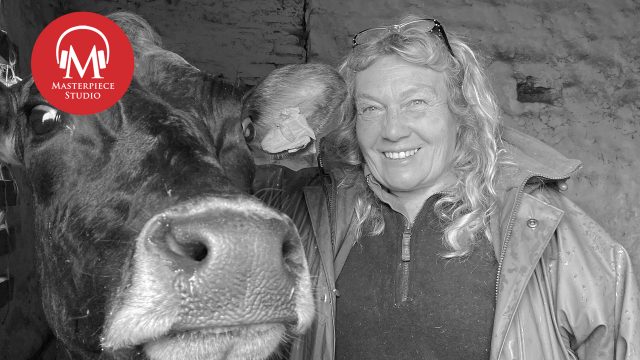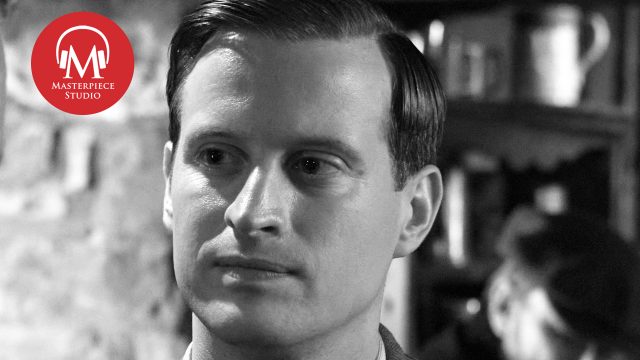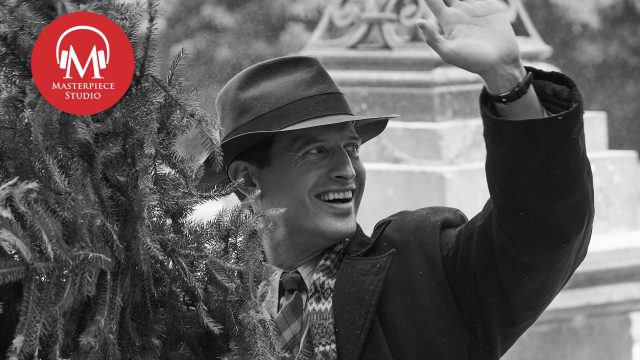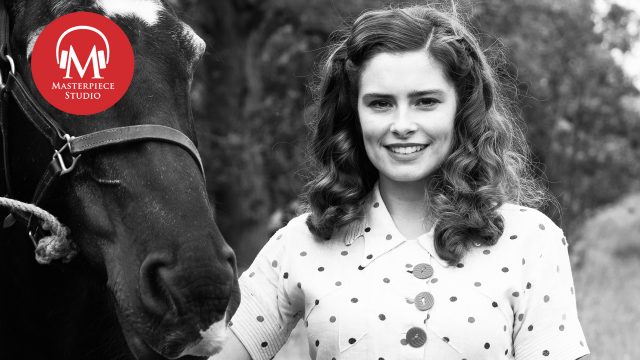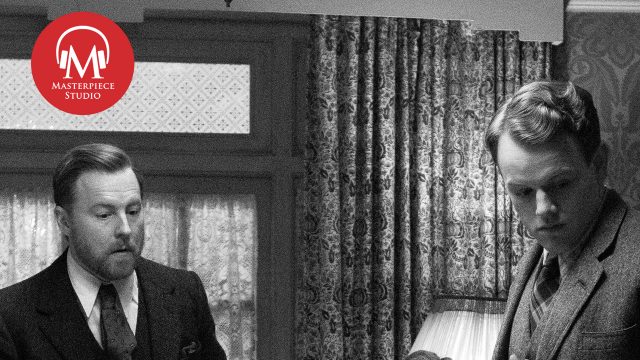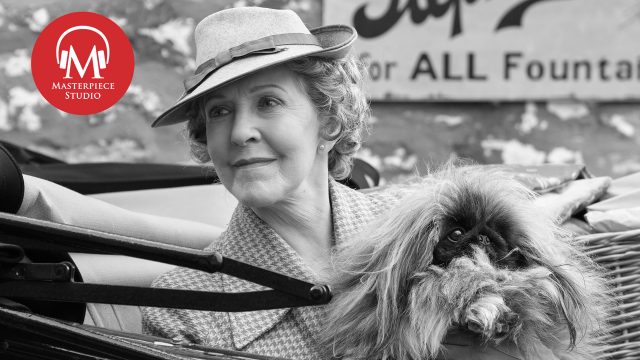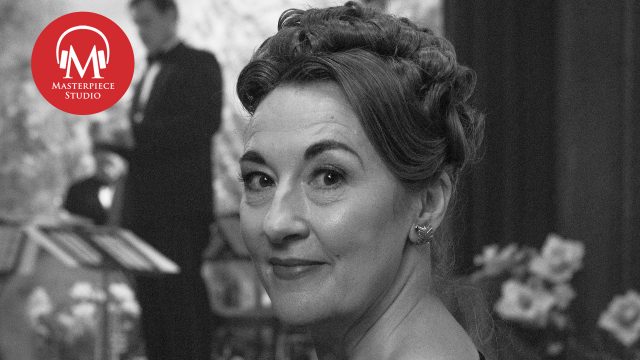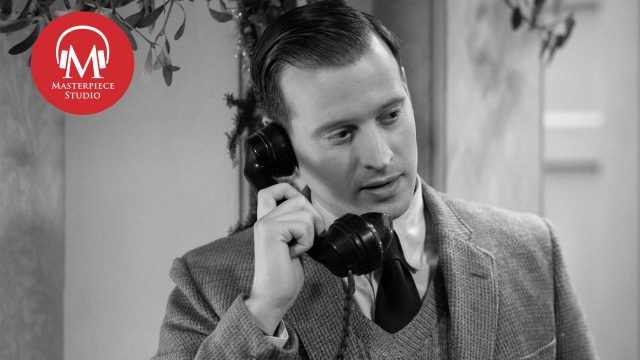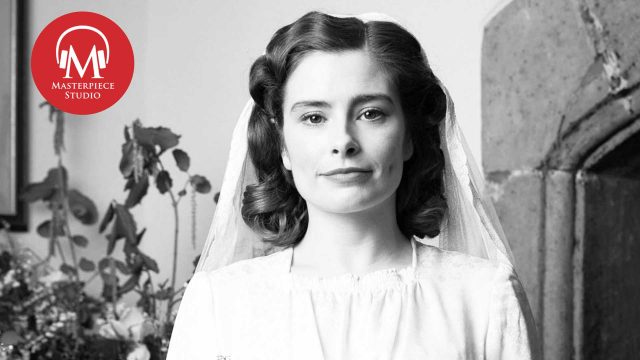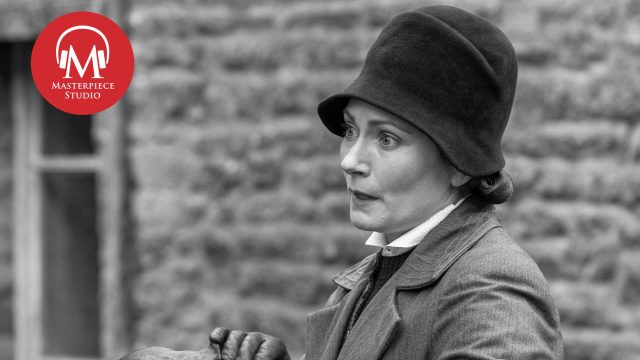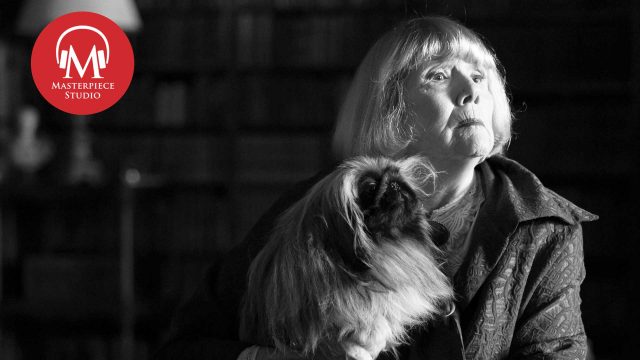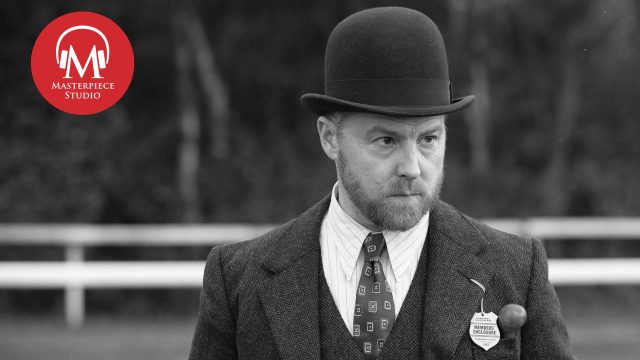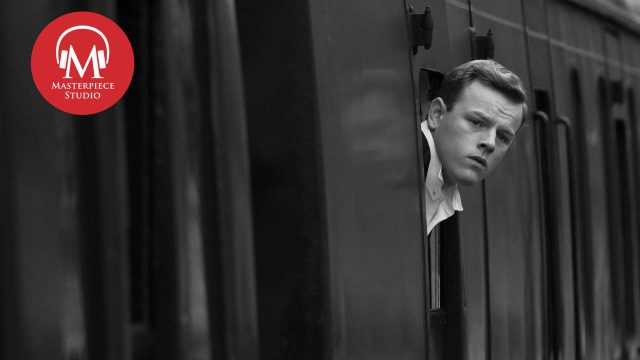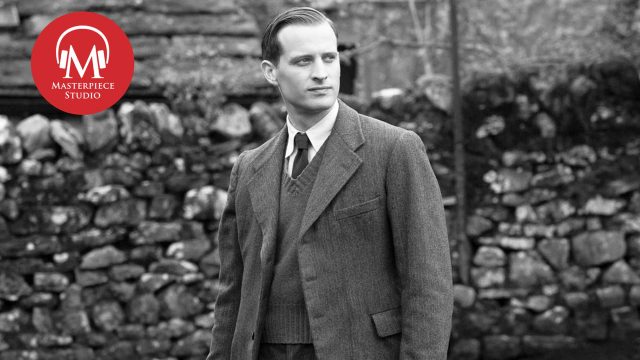The soothing, gentle nature of All Creatures Great and Small renders the pain and struggles of ordinary life in warm, calming tones. Much of that comes from the book series’ original author, Alf Wight, but it also comes from executive producer and head writer Ben Vanstone. He explains how he plans each cycle of the show — and his genuine, real life love of animals.
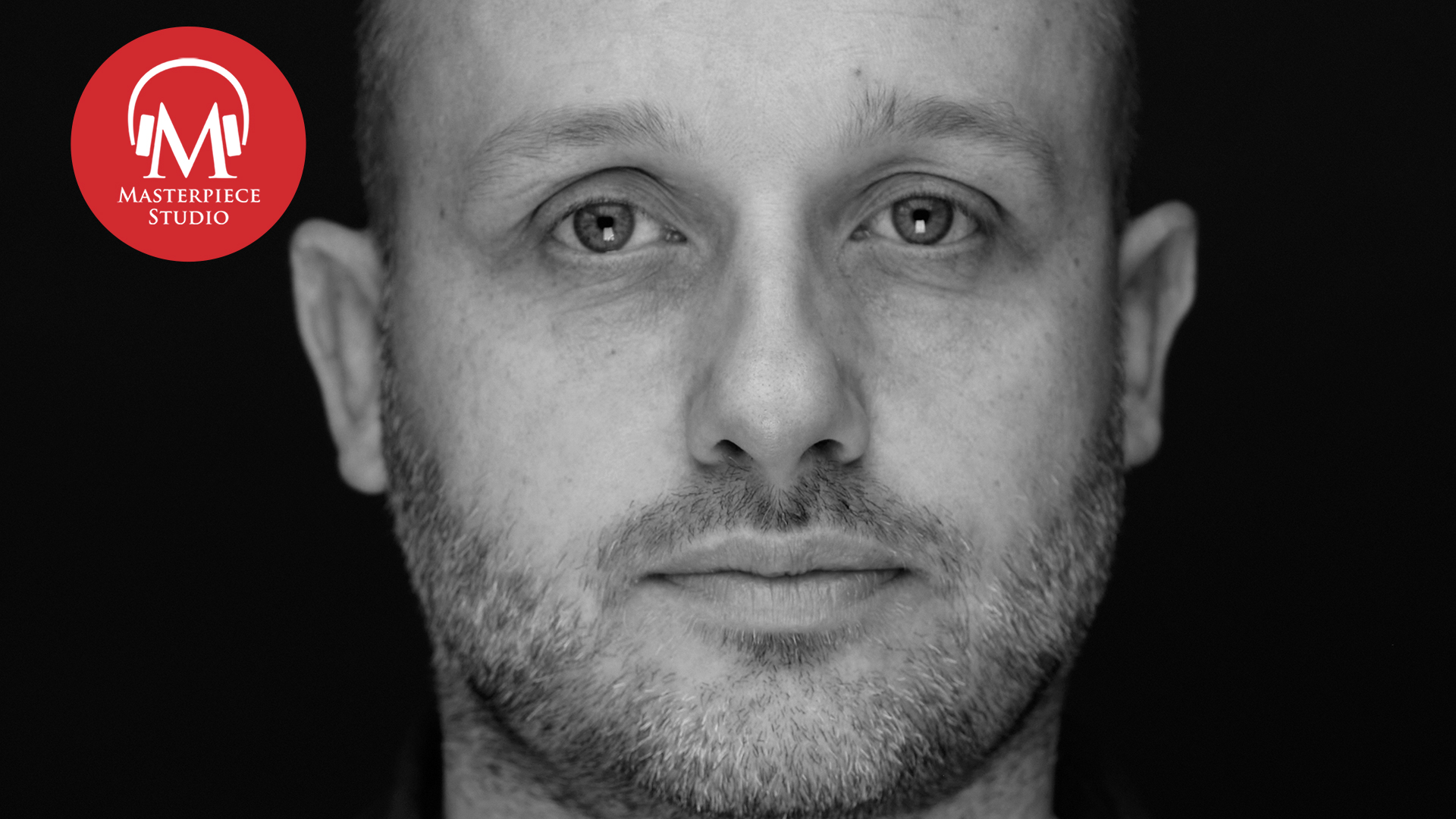

Don’t Worry — Ben Vanstone Really Does Love Animals
Released 40:04
Related to: All Creatures Great and Small, Season 2
Download and subscribe on: iTunes | Spotify| RadioPublic
Transcript
Jace Lacob: I’m Jace Lacob, and you’re listening to MASTERPIECE Studio.
If you’re anything like us, you’ve been missing the grandeur of the Dales since we last checked in on our favorite Yorkshire veterinary practice.
CLIP
James How’s things goin’ with you then?
Tristan Good grief, two weeks away and I can barely understand you.
James The place rubs off on you.
Tristan Well, if you want any of the farmers to understand a word you’re saying, you’ll have to rub it off again.
Jace James Herriot has been homesick, too, heading back to his native Scotland for a short visit with his family before returning home to Siegfried, Tristan, Mrs. Hall, and all the needy animals of Darrowby.
CLIP
James Siegfried! There’s nothing here. Not a single bite mark. No blood. I can’t find anything wrong with them.
Siegfried This one’s rasping a little. See how her heads lolling about, like she’s drunk.
Rob Benson has been keeping his distance but now he moves forward.
Rob What’s that you’re saying?
James They’re still alive, Rob!
Jace There’s a lot at stake this season for James, including his will-they, won’t-they romance with Helen Alderson, and his lingering attachment for the modern conveniences of a veterinary practice back in Glasgow, but there’s still something about the Dales that inevitably rubs off on us all.
CLIP
James It was only a couple of weeks I was away but you forget how beautiful this place is.
Siegfried There you are! I called in on Richard Alderson this afternoon –
James Before you start, Rob Benson agreed to it.
Siegfried I don’t care if it was sanctioned by the bloody Pope. I distinctly remember telling you –
James We don’t always have to live by the old rules on how to do things. We can make some of our own.
Jace All Creatures Great and Small head writer and series executive producer Ben Vanstone knows just what to expect on these next six episodes, and he joins us to look ahead at another season of beautiful, bucolic comfort viewing.
Jace And this week we are joined by All Creatures Great and Small writer and executive producer Ben Vanstone. Welcome.
Ben Hi.
Jace So before we dive into discussing season two, I’m curious what your relationship was with the original run of All Creatures Great and Small back in the day. Was it a show that that meant something to you? Growing up in the Barkshire countryside, did you watch it with your family?
Ben Yeah, absolutely, it was one of those sort of, those nights of TV with the whole family would get together. It was on Sunday night, I think it went out and we would watch it probably, I think through it’s sort of mid to late 80s, I remember sort of watching it with my family. It was actually one of the few things that we got together and watched. So, yeah, I remember quite fondly. I think that it was…it lent in more to the humorous side of things. I seem to remember it. It felt a bit more of a sitcom than I think our show is, but I had fond memories of it from my childhood, certainly.
Jace And you went back to Alf Wight’s James Herriot books when you were pitching on this. How did you approach the source material? Was there a sense that it was sacrosanct or that this was material that could perhaps be dismantled and reassembled as the narrative required?
Ben Well, I think that when I went back, I mean, I hadn’t actually read the books before I was asked if I was interested in the job, and then I sort of started reading them all, and I realized that this sort of, there’s another whole layer that which I didn’t feel was fully explored in the original TV series, which I got really excited about, actually. And finding that extra depth to these characters, understanding why sort of Siegfried is the way he is, what it must be like in reality for James leaving his home to go to this completely new world of the Dales and the interesting characters he meets there. So for me, it was an excavation of that book, and almost a treasure hunt going in there and finding the bits that I was really interested in pulling those out and sort of creating our own narrative with those stories. In the books themselves, they because they’re so anecdotal that you they don’t kind of knit together as a coherent throughline. So we had to do that work of building what those characters’ arcs would be, and I saw a great opportunity to that to do a really interesting show.
Jace I love the notion of you being sort of a narrative archeologist, as you say, sort of excavating and and even restoring some of these things. The show takes some of these stories in different directions than the books do — the sheep in this first episode, or the Irish traveler and the dog in a later episode are vastly different than they appear in the books. How do you decide what will make it in and what won’t, or how to alter the story so they fit within the necessary framework that you’ve constructed?
Ben We try to pull them together in terms of theme and how they work with the other stories and how they interact with our characters’ ongoing serial arcs. For taking the Irish traveler’s story as an example, that’s certainly where Tristan has reached the point in his life where he’s got to make some decisions. And that story, which is about, I would say, the reasons why one might be a vet, I think really spoke to Tristain’s decision in that episode. I’m trying hard not to give away what happens, knowing where it comes, but so we look at those stories and how they work thematically for our characters and also how they interact with the other stories within that episode. Often, because the original stories are written very retrospectively and told in almost one scene, one moment, and within those moments, Alf Wight sort of really gives you so much character and backstory, but it’s actually just one event. And so what we have to do is find a way to build a story out of that event in a way that tells the wider narrative of Alf Wight’s original story and who those characters are. And I think that’s particularly true of also this was the Mrs. Dalby story, which we will come to at some point in series two, where which I think is a great story from the book, which we use again to resonate with what James and Helen are going through at the time and the importance of home and how we value that we have over all the things we could have.
Jace Hmm. I mean, I love the fact that the sheep story here becomes a way to bring in Jenny, to bring in the Aldersons, to get James and Helen, sort of to see each other again and to sort of examine and sort of again this sort of the love and care that James has for animals and the way that he is sort of seeing things differently, perhaps as an outsider. It’s a very sort of useful way that I think that that story is used here. What has been your relationship with Alf’s children, Rosie and Jim? What sort of dialogue have you had with them since you started working on the project
Ben With the show, we have a regular dialogue with Jim and Rosie. I first met them when we very first pitched for the show, which is, I think back in 2016, I went up to Thirsk and I met them and we went around to the James Herriot Museum. They’re really correctly and wonderfully protective of their father’s work, and we reassured them that our sort of intention has always been to honor and capture the spirit of their father’s work, with the understanding that a novel isn’t a TV show, and you need to find a way to sort of capture that, the essence of the books and reinterpret that for screen because they’re completely different mediums. And we have an ongoing consultancy with with Jim and Rosie through my colleagues, I work with Alice, who’s our script executive and Melissa Gallant, the other exec producer, has a close relationship with Jim and Rosie. And I think there’s also a…we keep a little bit of distance between myself and Rosie and Jim directly. To be able to write and to work freely in a way with the source material, it’s also important to have a little bit of distance between me and almost the custodians of that material.
Jace No, I mean, that’s fascinating to me, because it would force a sort of emotional relationship there where perhaps as you say, you need that, that sort of remove in order to be able to to actually write this. You know, was that a consideration ahead of time or was that something that sort of developed naturally given how involved Jim and Rosie have been as consultants?
Ben Yeah, I think it’s something that was considered, because not just for my ability to work freely, creatively with the material, but also, because for them, I don’t think it’s right that they would be getting phone calls and emails from lots of different people asking different things at different times. I think that having a clear line of communication where everyone is on the same page is really important on a project like this where you have got consultants and we have got veterinary advisers and there’s a lot of information that needs to be marshaled and channeled. And if we were all sort of firing off emails and sidebarring with different people, then I think the process could get quite messy and they would be getting phone calls from different people at all hours. So I think it was important right from the get go to build those processes into the how we made the show. And it’s working really well. You know, Jim is whenever I have a story and there’s a, I’m looking to sort of change something on the books, or if there’s something that I’m asking, always there a way that we could even something as simple as make this a different animal other than a cow. Because, for example, there’s lots of cow stories in the books, so we, in not wanting it to be too repetitive on screen. We’ll ask Jim, ‘Is there a way to be another animal? What if we could quite tweak the illness slightly?’ And Jim’s really receptive in that, and actually consults and gives us a lot of our storylines. In this first episode, we asked Jim. I mean, it’s in the original book that the dogs, you know, that some dogs have got in with the sheep, and that’s what sort of caused them all to go down. And we got to sort of thinking, ‘Well, what’s the repercussion of that?’ And in in sort of the Yorkshire Dales, if your dog, even now, if a dog gets in with sheep, the farmer will probably see it within his right to shoot that dog if it’s chasing the sheep. And certainly back then, even more so, and we went to Jim and asked, ‘What could James do with a dog? If it’s could it be taught to to not frightened sheep? And it was to save its life in a way?’ And he advised on that and sort of talk to us about what you might do to teach your dog not to not to worry sheep anymore.
CLIP
James We’ve worked hard with Scruff. He’s not going to scare any more sheep.
Jenny He’s good now, Mister Benson, and I’m gonna make sure he never goes off again anyways. All the same – if you say he needs…you know.
Rob Nay, you carry on, lass. I reckon some good came out of it after all.
Jace I mean, to me, it reveals just sort of the razor-thin sort of margin that a 1930s Yorkshire farmer would have, that this is not just about a dog disrupting sheep, but this is sort of his livelihood, his ability to pay rent, to put food on his table, to support his family, and that the stakes are so much bigger than perhaps our modern vantage point would allow for.
Ben Absolutely, I think that everyone, and even farmers now, it’s hard work on small holdings as well and their animals are their life. And I think that’s what makes what James and Siegfried and Tristan do so important in the Dales. These people, they really rely on the vets and they, yeah, it’s their livelihood. So when someone threatens that, it’s very personal to them. And, you know, I think that I think it’s quite an understandable reaction in that context to want to have that dog put down so it doesn’t cause any more damage.
Jace One of the biggest changes is All Creatures’ handling of its female characters. Audrey Hall is a three dimensional character here. Helen is plucky and complicated. Even Jenny gets nuance as she struggles to reach adolescence without a mother. Was there a conscious effort on your part to give these characters more agency?
Ben Yes. I mean, undoubtedly. I think that a book can sort of, it works through a very tight lens of what the author kind of allows you to see. So in a lot of these stories and of Herriot’s, Mrs. Hall and Helen don’t feature, so it’s a very sort of male perspective, and the stories are told about men with agency and when when you adapt something, you open up that world and you’re seeing that house and those characters inhabit that world. So naturally, you have to give them the same agency and perspective that you and treatment that you have them, the male characters, because they’re there, they’re present in your world. So they they deserve that deserve equal attention. And that was our ambition right from the start. And again, one of the real opportunities I saw when I first read the books of what we could bring this adaptation, I think that with Helen and Mrs. Hall, we have really found two great female characters who are modern women of their time, I would call them which, which again does hark back to Helen from the books, for example. And I remember speaking to Jim Wight right at the beginning, and he made a point of telling me that his his mom was the first to wear trousers in the village, and she was always wearing her green slacks and which kind of stuck with me, and that became my model of who Helen would be, sort of a forward-thinking woman in 1938 Yorkshire.
Jace The James Herriot we meet early in All Creatures is a city lad. He’s a Scotsman. He’s very much an outsider in the Yorkshire Dales, which is a place that’s about as far away from an urban existence as you can get, especially in the 1930s. How important was it to you that we begin by seeing James’s life in Glasgow at the start before following him to Darrowby?
Ben Yeah, it always…that was one of the first things that popped into my head was that I want to see where he’s from because again, it’s from the book. There’s this great passage in the book, how he describes what it was like first arriving in the Yorkshire Dales having grown up in the city. And I just thought, ‘We need to find a way to convey that to the audience to convey that this world is so far out of this experience that we understand his reaction to it.’ If he’s already there, and we meet him in Yorkshire, we don’t realize what a contrast this is for him and what a fish out of water he is. It was all about understanding James and understanding where he comes from. So then we could understand the arresting effect of the Yorkshire Dales.
Jace On that note — like, like many late converts to a religion, it’s James who is sort of the strongest believer. The series is a love letter to the Dales, and to a country vet’s life, and James falls in love with the beauty of his surroundings I think because he sees it with an outsider’s eyes. How does that perspective underlying your own as the show’s writer? Is he sort of a stand in for your own perspective?
Ben I mean I suppose a bit, yeah. I grew up in the country and then sort of ended up in London, so it’s almost the reverse journey, I suppose. But I think we all make a bit of a leap in our working life, and especially when I quit what I was doing to become a writer that always. Yeah, that was always, it’s like a big leap to sort of give up, give up work. And I actually went home, just as James’s journey inverted in a way I went home to to follow my dream, whereas he left to find his. But yeah, it’s definitely relatable. And the people you come across as well within those worlds, and you know, they’re not Yorkshire farmers, but the TV industry has its characters as well.
Jace A Siegfried Farnon, perhaps, even.
Ben There’s a few floating around, yeah.
Jace Before this next question, a brief word from our sponsors…
Jace Season two begins not in Skeldale House or even in the Dales, but back in Glasgow, where James has returned home, sort of mirroring the start of the first season, we sort of pick up with him back in Scotland. Why was it important that season to start outside of the Dales to find James removed from these surroundings he’s come to know and love?
CLIP
Bill If you ever get the yearning for home. The lad you’re covering for is joining up, six months’ time there’s a job if you want it.
James That’s a very kind offer, Bill, but…
Bill Veterinary practice isn’t all about farm animals. Pets is where the future lies. I don’t need your answer right away. Take time to think on it, eh.
Ben I think that I’m attracted to cyclical stories, and I think especially with this subject material where we are going through each year almost as a cycle, it’s almost as each year is another cycle of James’s life and the other characters’ lives and and through the seasons there’s a cycle to the the Yorkshire Dales and farming. And for me, it was important to even in the structuring of the series, to and to reflect that in a way. So that was one one of the reasons why I wanted to look at Glasgow. The other was to again give James a choice, a reminder of where he’s come from. It’s not a given that he is going to just stay in the Dales the rest of his life. In series one, he leaves Glasgow for his first ever job. In series two, he’s deciding where he’s going to be, probably for the rest of his life. So it’s not important to me that we show the opposite side of that choice. What could be drawing him away from this amazing place? What could be making him stay in the Dales? Is it just the work? Is it more than that? So for me, it was. Those are the main reasons for doing that.
Jace I mean, for me, the job offer in Glasgow does complicate matters for him and for him and Helen with this sort of ticking clock element that’s introduced here. He sort of has six months. The question presented to James becomes more than just sort of romantic. It’s also somehow pastoral versus urban, modern versus traditional. What is his his mindset when we pick up with him in this first episode?
Ben Well it’s three months, essentially since the wedding or the wedding that wasn’t, and she hasn’t seen Helen yet, and he doesn’t know what the fallout has been from that. He’s given her space and time because he doesn’t want to force the issue. He knows he has feelings for Helen, but also appreciates that she’s been through something incredibly traumatic. Helen, in a way, loved Hugh, and does love Hugh, even if that is just as a friend. So he appreciates that this is going to be really hard for Helen, and she’s kept herself away. everyone in the village knows about what happened, and she’s finding it hard to show her face. In some ways he’s just waiting and giving her that space until in his first episod,e something happens that brings them together.
Jace Scruff here becomes symbolic for second chances.
CLIP
James I know I’m not from around here, and I might not understand the way things are done but I know the difference between right and wrong. Killing a perfectly good animal can never be right.
Helen It’s not your dog or your reputation.
James It was a mistake. Animals mess up sometimes. Just like people do. There’s no reason for you to keep punishing yourself for anything.
Helen What am I supposed to do? Carry on as if nothing’s happened?
James What’s the alternative? The dog didn’t do anything wrong. He deserves a second chance. I think you both deserve a second chance.
Helen I should get Jenny back.
James I’ve missed you.
Helen I missed you too.
Jace How challenging is it to write scenes that rely on the subtle or unspoken rather than the overt?
Ben It’s really easy when you’ve got good actors, which we get really, which we are really blessed with. I think that we always end up taking things out of the script. I think we, you know, I have a tendency to overwrite, maybe. And then as I’m hearing it or working through the drafts or as soon as the actors get it in their hands, you find yourself wanting to take lines out, and that even might be in the edit. When you see it, you kind of go, ‘We’re getting that with a look rather than by putting it all on the page.’ So I think that the actors, you know, they bring so much to this, all of the, all six of them. I feel like Jenny, Imogene, who plays Jenny, is now as part of this ensemble as any of the others in this and earned her place in that, but that they’re really great at that. And I think you have to be careful you don’t preempt the actors too much and sort of write the nuances which they want to bring and find themselves into it. So yeah, I would tend to try and be sparse with it. But no, it’s a lot easier with good actors, I have to say.
Jace Do you see All Creatures, then, as sort of a slow TV that the deliberately slow pace of the narrative is itself one of the main drawing points, particularly in an era where so many shows burn through plot at such a rapid click?
Ben I don’t know if I call it slow TV. I would say that it’s always been our mantra that small is big on this show and because we built the world where the stakes are seemingly small, like a cow not getting up, for example, it does not sound like a, you know, a dynamic half of an episode. But because in the world that we have set up and the importance of that cow for those farmers, it then suddenly is imbued with incredible stakes without us having to go searching for a big sort of overblown, overly dramatic moments. And I think we’re very conscious of that, and I think we’re very conscious of leaning into those smaller moments, not least because I think where its success lies and what we always get back to is that we want it to feel truthful and real. So I don’t know many people who have experienced murders or, you know, been in sort of espionage thrillers or had a superhero fly them out the window. But some of the day to day sort of conflicts, the emotions and the heart of our stories, I feel that people can relate to. And that’s always what we’re trying to do. I think that we’re reflecting people’s lives back at them. And maybe most people’s lives are a bit slow. Maybe most of the time, most of us are not going through high drama, so perhaps that’s where it appeals and where it sits well with an audience.
Jace I mean, on that thread, Town and Country recently described All Creatures as, quote, ‘the most soothing show on television.’ A New York Times article deck said that the show quote, ‘heals cows and soothes souls.’ That that word keeps coming up. Soothing. Soothe. Was that an intentional aim for All Creatures, to soothe?
Ben I always wanted it to be like a bit of a warm hug, without sounding too cheesy, I kind of felt that I didn’t want any villains in the show. It was about good people trying to do good things and that might not always mean it’s not without conflict. But ultimately, I didn’t want a show that was cynical. At the same time, I didn’t want to show that was saccharine. I feel that we’ve got to tread that sort of fine line between rose-tinted nostalgia and truthful portrayal of the Dales in the 1930s, which is a balance. I think that we need to have it to be soothing, I think you also need the harder times. Otherwise it gets too much, would be too cloying. So yeah, I think it’s the rough and the smooth in that, with the cows that we save, there are also horses that get shot. And it’s yeah, I think for me, that’s what the show is about. It’s sort of a happy, sad space. But yeah, it’s always been gentle and good-natured and kind, I would say that was always the ambition to be in that space.
Jace But you’re not you don’t sort of have on your whiteboard like ‘X days since we’ve killed an animal.’ You’re not thinking like, ‘We saved a cow. We need to kill a horse. We need to balance the scales here.’
Ben No, I mean, I think you are constantly looking at the tonal balance that in the show is happy, sad, funny, losing. I think we move quite quickly through different times, and that’s that’s a challenge. And I think that, you know, as I think I’ve said before, you could only have your happy moments if at other places counterpointed by sadder moments as as life is. So yeah, we do we do try and keep that variation in tone, albeit not quite as schematically as when did we last kill a cow? We actually do have to watch that because there’s quite a few emotional stories in the book simply about animals that are put down, which are obviously the most for me reading that always found those heart wrenching stories. And you know there’s one with a Labrador, which James puts down for for an old man in an alm’s house and it’s this old man’s sort of only friend. And it’s such a moving story. I just don’t know where I could put it in. It’s almost become sacrosanct, and it’s almost too painful. I don’t know. So we keep having a variation in tone. But yeah, we can’t have an animal dying every week.
Jace In season two, we’re moving ever closer to the start of the Second World War. Without spoiling anything, there’s some newsreel footage at the cinema that to us screams sort of ‘Danger ahead.’ Was there a sense that the war would somehow be baked into the plot of all creatures that season? Blank would have to be the war season, as it were.
Ben The way our series is structured, so we move through from year to year. I think I mentioned before how I preshaped cyclical stories, and I feel that we’re going into 1939 series three. It’s no spoiler to say that war breaks out in 1939 and our characters inhabit that world. So yeah, at some point the war will come to the Dales. But we’ve got to remember what our show is and our show is about vets in the Yorkshire Dales and those communities and those people. So any time we will play out, we’ll be very much through the world that we’ve created. I don’t think we’ll suddenly be with Tristan and James and Siegfried on the Western Front or anything like that. I think that we will always be anchored in the Dales, albeit we may experience outside events through that world.
Jace I’m glad to hear that. One of the biggest changes between these two seasons is, of course, the change in actor for Mrs Pumphrey after Dame Diana Rigg’s death last year. What sort of conversations did you have with the producers about recasting the role? Was there ever a possibility, however slight, that you wouldn’t recast?
Ben I mean, we discussed all, all considerations and options it felt to us, ultimately that Mrs Pumphrey, in fact, all these characters are iconic characters that have been played through many different people through history. And like Shakespearean characters, you feel that the mantle is passed from actor to actor to actor. And there’s a history of that. So we felt more comfortable thinking about it in those terms if we didn’t really want to let Mrs Pumphrey go as a character. So we look to recast that. Yeah, we spent a long time thinking about that and a long time soul-searching and checking that we felt we’re doing the right thing and doing it properly. Because Dame Diana Rigg so much and was so wonderful in the show and was a great Mrs. Pumphrey. But at the same time, we we’ve got a responsibility to the characters and the stories that we’re telling to fully fulfill that that role and say, ‘Yeah, we looked around and tried to find the best best actor we could find to replace her.’
Jace And I am such a huge admirer of Patricia Hodge. And for me, I couldn’t think of anyone else I’d rather step into Mrs. Pumphrey’s rather intimidating shoes than Patricia. What was it about her that made you say, ‘She’s the one’?
Ben Everything! She’s great. I had a really great conversation with Patricia quite early on when she was considering the role because Patricia also wanted to make sure that she was taking the role on in a respectful way. You know, she wasn’t going to be doing it exactly like Diana Rigg was, but she was creating her own character that I think built upon the foundations of what they are and had there already. So Patricia wanted to talk about Mrs. Pumphrey and what her interests were and who she was. And we had a long conversation about cricket as well, actually, which, you know, Patricia happens to be a big cricket fan and is at Lord’s quite often, which I’m particularly jealous about. And so that was quite fortuitous because I was happening to be working on a storyline at that very moment about Mrs. Pumphrey and cricket, which she also is a fan of. So it was a very happy coming together, and I think she brings something fantastic to the cast. And in a recent press event, we did. Patricia described Mrs. Pumphrey as the grandmother. If you’ve got sort of Mrs. Hall is the mum and Siegfried is the dad and Tristan and James are the boys, you know Mrs. Pumphrey’s the grandmother of the family. I think it was a really good way of putting how I see that character in our world.
Jace The episode ends with James back at Skeldale House standing up to Siegfried. He says, ‘We don’t always have to live by the old rules and how to do things we can make some of our own.’ Is James emboldened by the incident with Scruff, admitting that he missed Helen, or his time away? What enables him to stand up to Siegfried now?
Ben I think all of that, I think he is growing as a man and he is growing as a vet and he is finding, you know I think with James, each series is a little step in manhood. You know, he’s gone from his first job to actually now being someone of responsibility. He’s senior vet in the practice and as he slowly grows in confidence, he will become more and more Siegfried’s equal. Whether or not Siegfried will ever allow him to become an equal fully, fully become an equal is another matter.
Jace Some of the things that I love most in All Creatures are often the ones at Skeldale House with James, the Farnons and Mrs. Hall. These scenes that sort of pulse with genuine emotion and familial comfort. What makes these scenes so pleasurable to write?
Ben I love scenes where we have that whole family together, and I like scenes from, they’ve got all of them in the room at the same time, all of them talking and often at cross-purposes or crossed intentions. I think that’s just great fun and you can always find some humor in that. I mean, the characters and the actors are so much fun to write for. And also the set, the set is just the best playground. It’s been designed by Brian Percival, our lead director, and Jackie, our designer, to have all these different routes and doors and ways through it that you can really sort of plot these very intricate moves with all the cast and different directions and coming into each other’s stories at different times. I love this sort of clockwork intricacy of that. So, yeah, they’re great fun to write.
Jace Without giving much away, what can you tease about what’s coming up this season on All Creatures Great and Small?
Ben What’s coming up this season? Well, I think that sports fans, especially cricket fans, have got some things to look forward to. I don’t think we’ve seen the last of Hugh, which is something to look forward to, perhaps. And we have another Christmas special, which are always great fun to write.
Jace I do have to ask, you sort of mentioned this in passing. I mean, you are writing this far away from the muck of the farmyard. And obviously in season two, you weren’t on set, but you I can’t imagine you were even in season one getting much time with, say, Clive. Given the preponderance of animals in the series, I can’t help but wonder, are you an animal person?
Ben I am. Yes, I’ve got. We’ve got a dog and two cats, and I love animals. I’m a bit terrified of horses, to be honest with you. I grew up in a village called Lambourne, which was a racehorse village, so I was often surrounded, you have strings of racehorses coming down the street and kicking down a fence because they’re absolute lunatics, the thoroughbred horses. Yeah, I love animals and it’s amazing going up there. So I, you ‘re right, don’t actually get to be. Around Clive the Bull or any of the animals, he wasn’t often in the office. But yeah, whenever I can get to see them, I did. Yeah, we like animals, though. I think we’ve got maybe one too many in our house at the moment.
Jace You can never have too many.
Ben No, you can never have too many, right.
Jace Finally, what is next for you?
Ben Well, we are, you know, unbelievably, we are a week, two weeks into pre-production on series three at the moment, and I’m very much looking forward to that. So, yeah, we’re gearing up. We are deep into the scripts and I’m currently working on another Christmas special at the moment.
Jace I can’t wait for series three. Very excited. Ben Vanstone, thank you so very much.
Ben Thank you so much. It’s been a real pleasure.
Jace Coming up next — Siegfried Farnon is a difficult man, and it sometimes feels like his stony heart is impossible to crack open.
CLIP
Siegfried Morning Mrs Brompton –
Diana Diana – please.
Siegfried How can we be of service?
Diana Daffodil Ball. If you’re not too busy I wondered if we might lure you on to the dance floor?
Siegfried Well, that depends what you’re using as bait.
Jace Dorothy Atkinson — who plays Diana Brompton, a Darrowby divorcée who may have designs on Siegfried — joins us on the podcast, Sunday, January 16.
MASTERPIECE Studio is hosted by me, Jace Lacob, and produced by Nick Andersen. Elisheba Ittoop is our editor. The executive producer of MASTERPIECE is Susanne Simpson.
All Creatures Great and Small Podcasts 16 More Podcasts
MASTERPIECE Newsletter
Sign up to get the latest news on your favorite dramas and mysteries, as well as exclusive content, video, sweepstakes and more.











